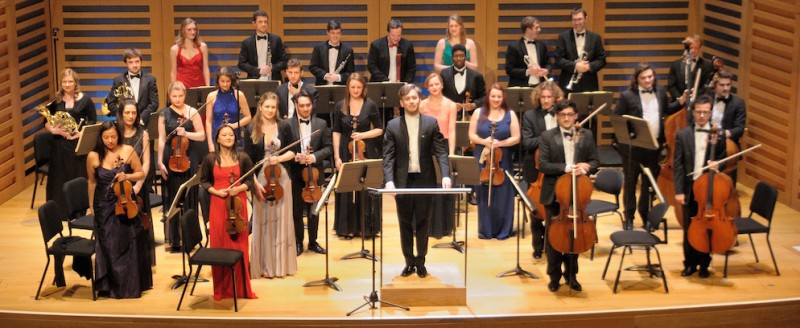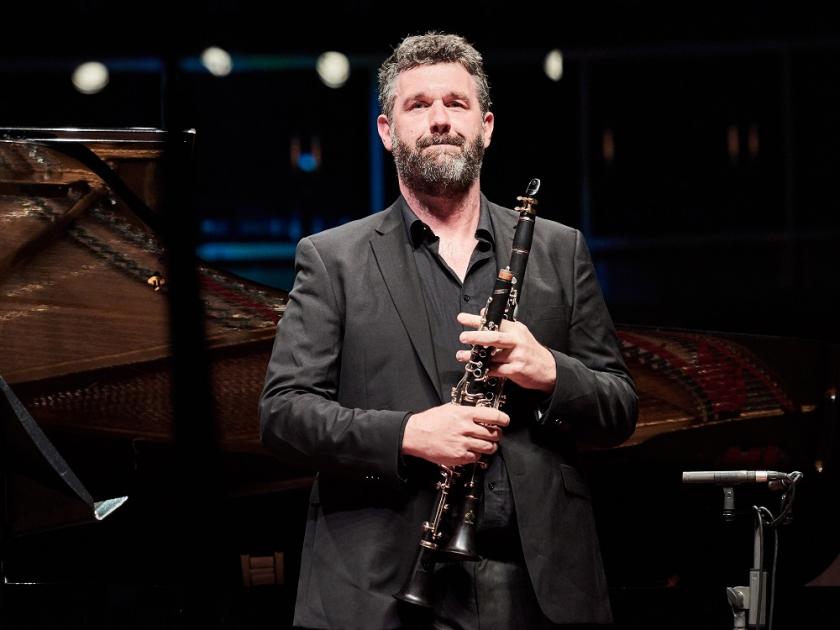It's harder for young professional musicians to be judged in standard repertoire – the very greatest music, in short – than to make their mark tackling the unknown in a wacky venue. High levels of energy and technical skill married to interpretations with something to say are what it takes, and what we got from the London Firebird Orchestra last night.
They were blessed in their choice from three "inner circle" conductors, Jonathan Bloxham, newly appointed Mirga Gražinytė-Tyla's assistant at the City of Birmingham Orchestra, with concerts of his own to come there. Blessed, too, that as a cellist in Paavo Järvi's Estonian Festival Orchestra Bloxham could call upon a supreme musician in that army of generals, Matthew Hunt, one of the top half-dozen clarinettists in the world – and that means the likes of Martin Fröst and Kari Kriikku.
You wouldn't hear a more perfect interpretation of Mozart's Clarinet Concerto anywhere. And you'd be unlikely, for that matter, to hear more riveting takes on Mendelssohn's Overture The Hebrides or Beethoven's Sixth ("Pastoral") Symphony. But let's start with the Mozart. Hunt announced that, the programme note having given various options of instrument, he would be playing the basset clarinet perfected by the man for whom the concerto was composed, Anton Stadler, so we might be surprised by the “honks” from an extended lower register. No “honks”, of course, but plenty of amazement at the depths, whether in underlining Mozart’s late-period turns from light to dark or simply turning bass-line to bright upper strings.
Having witnessed Hunt’s extrovert character and touches of comedy in superlative Pärnu Festival performances of Strauss’s Duett-Concertino and Bartók’s Contrasts, it was a surprise to see him tone it down for the classical tradition. The hallmark freedom of movement, self-conducting and leaning in to the players for perfect teamwork were still there, though. Bloxham also has hallmarks in classical and early romantic music, which meant articulate uplift in the outer movements and no lingering at the heart of the work to conjure the usual hindsight of autumnal bittersweetness. This Adagio came across as a song of thanksgiving anticipating the one we’d be hearing at the end of the “Pastoral”. Perhaps as a result, there was an even greater sense of magical transformation than usual in the pianissimo return of the main melody.
 The same subtle maturity was at work from the first phrases of Mendelssohn’s sea picture, a masterly fusion here of impetuous forward movement that never for a moment threatened to get out of control and space for the becalmed second theme – goosebumps, again – especially when it devolves to the principal clarinet. Joseph Shiner, no doubt inspired by the evening’s great soloist, wrought magic here and throughout the Beethoven. Bloxham (pictured above with the London Firebird Orchestra at Kings Place) kept its cheerful-to-ecstatic opening feelings and the Andante molto mosso’s brookside secret raptures on the move, but always with warm sounds to match his elegant, never overstated gestures and sometimes surprising perspectives in the landscapes, with exquisite inner-string colouring.
The same subtle maturity was at work from the first phrases of Mendelssohn’s sea picture, a masterly fusion here of impetuous forward movement that never for a moment threatened to get out of control and space for the becalmed second theme – goosebumps, again – especially when it devolves to the principal clarinet. Joseph Shiner, no doubt inspired by the evening’s great soloist, wrought magic here and throughout the Beethoven. Bloxham (pictured above with the London Firebird Orchestra at Kings Place) kept its cheerful-to-ecstatic opening feelings and the Andante molto mosso’s brookside secret raptures on the move, but always with warm sounds to match his elegant, never overstated gestures and sometimes surprising perspectives in the landscapes, with exquisite inner-string colouring.
The violins' announcement of the shepherds' song brought tears to the eyesSmaller-than-symphony-orchestra string numbers allowed wind and brass to make every one of Beethoven’s very individual points – I’ve never noticed so many in this work – and an impressive kinship with the approach of Robin Ticciati and the Scottish Chamber Orchestra in Mozart: coming from that Edinburgh concert on Thursday to this as the next simply kept the revelations in well-known scores coming. Beethoven's country dances stomped with full bass lines and braying horns; the storm broke with crisp timpani and clear attack; and the violins’ announcement of the shepherds’ song brought tears to the eyes for the first time in my experience, not least because the floating found its centre of gravity as the phrase continued to unfurl.
No further uplift was needed, but Bloxham and the Firebirds gave us a supremely playful Brahms Sixth Hungarian Dance, some vamping allowed in the reprise and the drafting in for second percussionist/trianglist of long-term collaborator Benjamin Baker, in the audience last night, who with Bloxham and a similar group of young players has given one of the two best performances of the Beethoven Violin Concerto I’ve heard in the concert hall. An entire Beethoven cycle from this team, symphonies and concertos, would be as worth hearing as any attempt by our starrier London orchestras.














Add comment